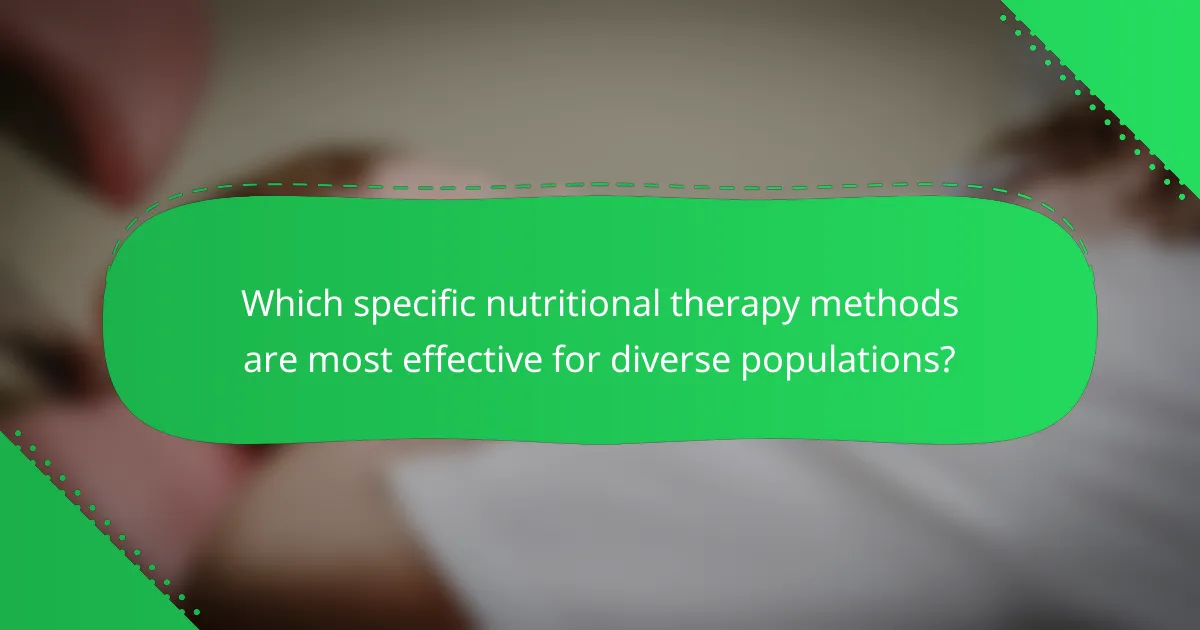Nutritional therapy approaches enhance community health and social well-being by promoting healthier eating habits and preventing chronic diseases. These methods include culturally tailored diets, community-based interventions, and personalized nutrition plans. They improve access to nutritious foods, foster social connections, and address unique dietary needs. Successful initiatives by organizations like the World Health Organization and the Food and Agriculture Organization highlight the importance of collaboration in achieving sustainable health improvements.

How do nutritional therapy approaches enhance community health and social well-being?
Nutritional therapy approaches significantly enhance community health and social well-being by promoting healthier eating habits and preventing chronic diseases. These approaches encourage local food systems, improve access to nutritious foods, and foster social connections through community-based programs.
For example, community gardens not only provide fresh produce but also create opportunities for social interaction, education, and skill development. Research shows that communities engaged in nutritional therapy programs report improved mental health, reduced healthcare costs, and increased overall life satisfaction.
Moreover, nutritional therapy emphasizes culturally appropriate dietary practices, which can strengthen community identity and cohesion. By addressing both individual and collective dietary needs, these approaches contribute to sustainable health improvements and a more vibrant community life.
What are the core principles of nutritional therapy in community settings?
Nutritional therapy in community settings focuses on promoting health and social well-being through personalized dietary interventions. Core principles include holistic assessments, culturally relevant practices, and community engagement. These approaches encourage sustainable dietary changes that enhance overall health outcomes. Collaboration with local resources fosters support networks and empowers individuals to take charge of their nutritional health.
Why is community engagement essential in nutritional therapy?
Community engagement is essential in nutritional therapy as it fosters collaboration, enhances knowledge sharing, and builds trust. Engaging communities allows for tailored nutritional interventions that reflect local needs and cultural preferences. This approach improves adherence to dietary recommendations, leading to better health outcomes. Additionally, community involvement can amplify awareness of nutritional issues, encouraging collective action towards healthier lifestyles. Ultimately, this engagement supports not only individual well-being but also strengthens social bonds within the community.

Which specific nutritional therapy methods are most effective for diverse populations?
Nutritional therapy methods effective for diverse populations include culturally tailored diets, community-based interventions, and personalized nutrition plans. These approaches enhance health outcomes by addressing specific dietary needs and preferences.
Culturally tailored diets consider traditional foods and cooking practices, promoting adherence and acceptance. Community-based interventions leverage local resources and support systems, fostering social connections and shared knowledge. Personalized nutrition plans utilize individual health data to optimize dietary choices, enhancing effectiveness through customization.
These methods collectively improve community health and social well-being by fostering inclusivity and addressing unique population needs.
How does culturally tailored nutrition impact health outcomes?
Culturally tailored nutrition significantly improves health outcomes by addressing specific dietary needs and preferences. This approach enhances community engagement and promotes adherence to nutritional guidelines. For instance, culturally relevant food options can lead to better dietary choices, reducing the risk of chronic diseases. Research shows that tailored interventions can increase knowledge and awareness of nutrition within diverse populations, fostering overall well-being.
What role do local food systems play in nutritional therapy?
Local food systems significantly enhance nutritional therapy by promoting access to fresh, healthy foods. They support community health by fostering local agriculture, which often leads to improved dietary options and better food security. Additionally, these systems can strengthen social well-being through community engagement and education on nutrition. By prioritizing local sourcing, nutritional therapy can address unique dietary needs and preferences within specific populations, leading to tailored health outcomes.

What are the measurable benefits of nutritional therapy on public health?
Nutritional therapy significantly enhances public health by improving health outcomes and reducing healthcare costs. It fosters better nutrition awareness, leading to lower rates of chronic diseases. Community programs implementing nutritional therapy often report increased access to healthy foods, promoting social well-being. For example, studies show that areas with nutritional therapy initiatives see a 20% reduction in obesity rates over five years. This approach also emphasizes culturally relevant dietary practices, which can uniquely engage diverse populations, enhancing community participation.
How does nutritional therapy reduce healthcare costs in communities?
Nutritional therapy can significantly reduce healthcare costs in communities by preventing chronic diseases. By promoting healthy eating habits, communities experience lower rates of obesity, diabetes, and heart disease, leading to decreased medical expenses.
Studies show that every dollar spent on nutritional interventions can save up to $10 in healthcare costs over time. These savings arise from reduced hospitalizations and fewer doctor visits. Additionally, improved nutrition enhances productivity and quality of life, further benefiting community well-being.
Community-based nutritional programs foster social connections, creating supportive environments that encourage healthy choices. This holistic approach not only addresses individual health but also strengthens community resilience and cohesion.
In summary, nutritional therapy serves as a cost-effective strategy for improving public health and reducing overall healthcare expenditures in communities.
Which health metrics improve through nutritional interventions?
Nutritional interventions can improve various health metrics, including weight management, blood pressure, cholesterol levels, and blood sugar control. These changes support overall community health and social well-being.
1. Weight management: Nutritional therapy can lead to significant weight loss, improving obesity-related health issues.
2. Blood pressure: Dietary modifications, such as reducing sodium intake, can lower hypertension levels.
3. Cholesterol levels: A diet rich in fiber and healthy fats can reduce LDL cholesterol and increase HDL cholesterol.
4. Blood sugar control: Nutritional strategies can enhance insulin sensitivity and stabilize blood glucose levels.
5. Mental health: Nutritional improvements may support mood regulation and cognitive function.
6. Immune function: Specific nutrients can enhance immune response, reducing the incidence of illness.

What challenges do communities face in implementing nutritional therapy?
Communities face various challenges in implementing nutritional therapy, including limited access to resources, lack of trained professionals, and cultural barriers. These obstacles hinder effective program delivery and community engagement. Additionally, financial constraints can restrict access to quality foods and education on nutritional practices. As a result, achieving optimal health outcomes through nutritional therapy often remains elusive for many communities.
How can barriers to access be overcome in nutritional therapy programs?
Barriers to access in nutritional therapy programs can be overcome through community engagement, education, and resource allocation. Increasing awareness about nutritional benefits fosters community participation. Accessible programs tailored to diverse populations improve reach. Collaboration with local organizations enhances resource distribution. Financial assistance programs can alleviate cost-related barriers.
What are common misconceptions about nutritional therapy?
Nutritional therapy is often misunderstood, leading to misconceptions that can hinder its effectiveness. Many believe it is solely about dieting or weight loss, overlooking its broader role in promoting overall health and well-being.
Another common misconception is that nutritional therapy is a quick fix for health issues. In reality, it requires ongoing commitment and lifestyle changes to achieve lasting results. Additionally, some think it is only beneficial for those with specific medical conditions, while it can actually support anyone seeking to improve their health.
People also often confuse nutritional therapy with fad diets, failing to recognize that it is based on personalized, evidence-based approaches. Lastly, there is a belief that nutritional therapy is expensive and inaccessible, when in fact, it can be tailored to fit various budgets and resources.

Which organizations lead successful nutritional therapy initiatives globally?
Several organizations lead successful nutritional therapy initiatives globally, including the World Health Organization, the Food and Agriculture Organization, and the Global Nutrition Report. These entities focus on improving community health and social well-being through evidence-based nutritional strategies.
The World Health Organization promotes guidelines for balanced diets and nutrition education, impacting public health policies. The Food and Agriculture Organization emphasizes food security and sustainable agricultural practices to enhance nutrition. The Global Nutrition Report provides comprehensive data and insights to guide nutrition interventions and policies.
These organizations exemplify how collaborative efforts in nutritional therapy can address global health challenges, ensuring better health outcomes for communities.
How do international case studies inform local practices?
International case studies provide valuable insights that can enhance local nutritional therapy practices. They showcase successful strategies, highlight community engagement methods, and demonstrate the impact of culturally tailored interventions. For instance, a study from a diverse urban area may reveal effective outreach techniques that can be adapted for local populations, improving community health outcomes. Additionally, these studies often emphasize the importance of collaboration among local stakeholders, which can strengthen the implementation of nutritional programs. By analyzing varied contexts, local practitioners can refine their approaches, ensuring they meet the unique needs of their communities.
What innovative partnerships enhance nutritional therapy outcomes?
Innovative partnerships enhance nutritional therapy outcomes by integrating diverse expertise and resources. Collaborations between healthcare providers, community organizations, and educational institutions improve access to nutritional education and support. For example, partnerships with local farms promote fresh produce availability, while alliances with fitness centers encourage holistic health approaches. These collaborations can lead to improved health metrics, such as reduced obesity rates and enhanced community well-being. Engaging multiple stakeholders fosters a comprehensive support system, ultimately leading to sustainable nutritional practices.

What future trends in nutritional therapy could shape community health?
Nutritional therapy will increasingly focus on personalized diets, community engagement, and preventive health strategies. Emerging trends include the integration of technology for personalized nutrition, emphasizing plant-based diets, and promoting local food systems.
1. Personalized nutrition will utilize genetic, microbiome, and lifestyle data to tailor dietary recommendations.
2. Community-based programs will enhance access to nutritious foods, fostering social connections and support networks.
3. Telehealth will expand nutritional therapy access, allowing remote consultations and ongoing support.
4. Emphasis on sustainability will drive interest in plant-based diets, aligning with environmental health goals.
5. Education initiatives will promote nutritional literacy, empowering communities to make informed dietary choices.
How is technology influencing nutritional therapy approaches?
Technology is enhancing nutritional therapy by improving data collection, personalization, and accessibility. Advanced apps and wearable devices enable real-time tracking of dietary habits, leading to tailored nutrition plans. Telehealth platforms facilitate remote consultations, making expert advice more accessible to communities. Artificial intelligence analyzes dietary data, providing insights that support better health outcomes. These innovations foster community health and social well-being by promoting informed choices and personalized support.
What emerging research areas are gaining attention in nutritional therapy?
Emerging research areas in nutritional therapy focus on personalized nutrition, the gut-brain axis, and food as medicine. These approaches aim to enhance community health and social well-being by addressing individual dietary needs and promoting holistic health.
Personalized nutrition tailors dietary recommendations based on genetic, metabolic, and lifestyle factors. The gut-brain axis research explores how gut health influences mental well-being, linking nutrition to psychological outcomes. Food as medicine emphasizes using whole foods to prevent and manage diseases, reinforcing the therapeutic potential of nutrition in healthcare.
These areas reflect a shift towards integrating nutrition into broader health strategies, fostering resilience and community engagement in health practices.
What best practices should communities adopt for effective nutritional therapy?
Communities should adopt collaborative strategies, personalized plans, and ongoing education for effective nutritional therapy. These practices enhance community health and social well-being.
1. Foster collaboration among local health providers, nutritionists, and community organizations to create a support network.
2. Develop personalized nutritional plans tailored to individual needs, considering cultural preferences and health conditions.
3. Implement ongoing education programs to raise awareness about nutrition’s role in health and well-being.
4. Encourage community engagement through workshops, cooking classes, and support groups to promote healthy eating habits.
